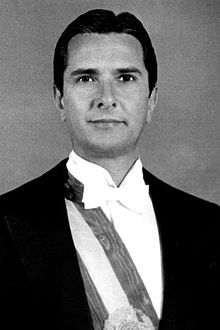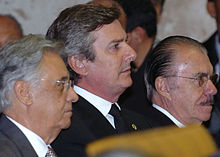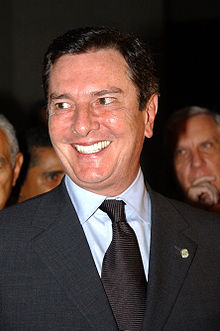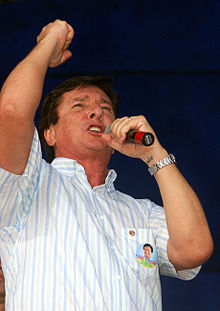- Fernando Collor de Mello
-
Fernando Collor de Mello 
32nd President of Brazil In office
March 15, 1990 – December 29, 1992[1]Vice President Itamar Franco Preceded by José Sarney Succeeded by Itamar Franco 55th Governor of Alagoas In office
March 15, 1987 – May 14, 1989Preceded by José de Medeiros Tavares Succeeded by Moacir Lopes de Andrade Federal Senator from Alagoas Incumbent Assumed office
February 1, 2007Personal details Born August 12, 1949
Rio de Janeiro, Rio de Janeiro, BrazilPolitical party National Renewal Alliance Party (1979–82)
Democratic Social Party (1982–86)
Brazilian Democratic Movement Party (1986–89)
National Reconstruction Party (1989–93)
Brazilian Labour Renewal Party (2000–2007)
Brazilian Labour Party (current)Spouse(s) Celi Elisabete Monteiro de Carvalho (first)
Rosane Malta
Caroline Medeiros (current)Residence Maceió, Alagoas Alma mater University of Brasília[2] Profession Economist Religion Roman Catholicism Fernando Affonso Collor de Mello (Portuguese pronunciation: [feɾˈnɐ̃du aˈfõsu ˈkɔlɔɾ dʒi ˈmɛlu]; born August 2, 1949) was the 32nd president of Brazil from 1990 to 1992, when he resigned in a failed attempt to stop his trial of impeachment by the Brazilian Senate. Collor was the first president directly elected by the people after the end of the Brazilian military government.
After his resignation from the presidency, the impeachment trial, on charges of corruption, continued, and Collor was found guilty by the Senate and sentenced to disqualification from holding elected office for eight years (1992–2000).
Collor was later acquitted of ordinary criminal charges in his judicial trial before Brazil's Supreme Federal Tribunal, for lack of valid evidence. After the end of his period of disqualification, Collor was elected a Senator of the Republic in the 2006 general elections and began his term in February 2007.
Fernando Collor was born in a political family. He is the son of the former Senator Arnon Affonso de Farias Mello and Leda Collor de Mello (daughter of former Labour Minister Lindolfo Collor), led by his father, former governor of Alagoas and proprietor of the Arnon de Mello Organization, the branch of Rede Globo in the state.
Contents
Early career
Collor became the president of Brazilian football club Centro Sportivo Alagoano (CSA) in 1976. After entering politics, he was successively elected mayor of Alagoas' capital Maceió in 1979 (National Renewal Alliance Party), a federal deputy (Democratic Social Party) in 1982, and eventually governor of the small Northeastern state of Alagoas (Brazilian Democratic Movement Party) in 1986.
During his term as governor, he attracted a lot of publicity by allegedly fighting the payment of super-salaries to public servants, whom he labeled marajás (maharajas)[3] (likening them to the former princes of India who received a stipend from the government as compensation for relinquishing their lands). The efficacy of his policies in reducing public expense is disputed, but it certainly made him popular over the country.[4] This helped boost his political career, with the help of television appearances in nationwide broadcasts (quite unusual for a governor from such a small state).
Presidency
In 1989 Collor defeated Luiz Inácio Lula da Silva in a controversial two-round presidential race and 35 million votes. In December 1989, days prior the presidential elections second round, Abílio dos Santos Diniz was the victim of a sensational political kidnapping. The act is recognized as an act of sabotage[5] of the elections having been executed on elections day and associating the act to the political left wing. As there was a prohibition of any political party of taking the media , television, radio or newspapers, on the days prior to election day, Luiz Inácio Lula da Silva's party had no opportunity to clarify the accusations that the party (PT) was involved in the kidnapping. Collor won in the state of São Paulo against many prominent political figures.[dead link][6] The first democratically elected President of Brazil in 29 years, Collor spent the early years of his government allegedly battling inflation, which at times reached rates of 25% per month.
The very day he took office, Collor launched the Plano Collor (Collor Plan), implemented by his finance minister Zélia Cardoso de Mello (not related to Collor). The Plan attempted to reduce the money supply by forcibly converting large portions of consumer bank accounts into non-cashable government bonds, while at the same time increasing the printing of money bills, a contradictory measure to combat hyper-inflation.[7]
Free trade, privatization and state reforms
Under Zélia's tenure, Brazil had a period of major changes, featuring what ISTOÉ magazine called an "unprecedented" "revolution"[8] in many levels of public administration: "privatization, opening its market to free trade, encouraging industrial modernization, temporary control of the hyper-inflation and public debt reduction."[9]
In the month before Collor took power, hyperinflation was 84 percent per month and growing. All accounts over 50,000 Cruzeiros (about US$1,300 at that time), were frozen for 18 months. He also proposed freezes in wages and prices, as well as major cuts in government spending. The measures were received unenthusiastically by the people, though many felt that radical measures were necessary to kill the hyperinflation. Within a few months, however, inflation resumed, eventually reaching rates of 25 percent per month.
During the course of his government, Collor was accused of condoning an influence peddling scheme. The accusations weighed on the government and they lead Collor and his team to an institutional crisis leading to a loss of credibility that reached the finance minister, Zélia.[8]
This political crisis had negative consequences on his ability to carry out his policies and reforms.[10] The Plano Collor I, under Zélia would be renewed with the implementation of the Plano Collor II; the government's loss of prestige would make that follow-up plan short-lived and largely ineffective.[9] The failure of Zélia and Plano Collor I led to their substitution by Marcílio Marques Moreira and his Plano Collor II. Moreira's plan tried to correct some aspects of the first plan, but it was too late. Collor's administration was paralyzed by the fast deterioration of his image, through a succession of corruption accusations.[11]
 The former presidents Fernando Collor (center), Fernando Henrique Cardoso (left), and José Sarney (right).
The former presidents Fernando Collor (center), Fernando Henrique Cardoso (left), and José Sarney (right).
During the Plano Collor, yearly inflation was at first reduced from 30,000 percent in 1990 (Collor's first year in government) to 400 percent in 1991, then climbing to 1,020 percent in 1992 (when he left office).[12] Inflation continued to rise to 2,294 percent in 1994 (two years after he left office).[13]
Although Zélia acknowledged later that the Plano Collor didn't end inflation, she also stated: "It is also possible to see with clarity that, under very difficult conditions, we promoted the balancing of the national debt – and that, together with the commercial opening, it created the basis for the implementation of the Plano Real."[8]
Part of Collor's more conservative program was followed by his successors:[14] Itamar Franco, Fernando Henrique Cardoso and Lula da Silva.[15] Collor's administration privatized 15 different companies (including Acesita, and began the process of privatization for others, such as Embraer, Telebrás and Companhia Vale do Rio Doce.[9] Some members of Collor's government were also part of the later Cardoso administration in different or similar functions: Pedro Malan, Renan Calheiros (PMDB-AL); Antônio Kandir (PSDB-SP); Pratini de Moraes and Celso Lafer; Reinhold Stephanes, Armínio Fraga; Pedro Parente.
Bresser Pereira, a minister in the previous Sarney and the following Fernando Henrique Cardoso administrations, stated that "Collor changed the political agenda in the country, because implemented brave and very necessary reforms, and he pursued fiscal adjustments. Although other attempts had been made since 1987, it was during Collor's administration that old statist ideas were confronted and combatted (...) by a brave agenda of economic reforms geared towards free trade and privatization."[16] According to Philippe Faucher, professor of political science at McGill University,[17] the combination of the political crisis and the hyperinflation continued to decrease Collor's credibility and in that political vacuum an impeachment process took place, precipitated by Pedro Collor's (Fernando Collor's brother) accusations and other social and political sectors which thought would be harmed by his policies.[9]
Awards
In 1991, UNICEF chose three health programs: Community Agents, Lay Midwives and Eradication of measles as the best in the world. These programs were promoted during Collor's administration. Until 1989, the Brazilian record vaccination, was considered the worst in South America. During Collor's administration, Brazil won an UN prize, as the best in South America, for its vaccination program. Collor's project Minha Gente (My People) won the UN award Project Model for the Humanity in 1993.
Corruption charges and impeachment
In May 1991, Fernando Collor was accused by his brother, Pedro Collor, of condoning an influence peddling scheme run by his campaign treasurer, Paulo César Farias. The Federal Police and Congress began an investigation soon after. Some months later, with the investigation progressing and under fire, Collor went on national television to ask for the people's support by going out on the street and protesting against "coup" forces. On August 11, 1992, students organized by the National Student Union (União Nacional dos Estudantes – UNE), thousands of students protested on the streets against Collor. Their faces, often painted in a mixture of the colors of the flag and protest-black, lead to them being called "Caras-pintadas" ("Painted Faces").[18]
On August 26, 1992, the final congressional inquiry report was released; the report concluded that there was proof that Fernando Collor had personal expenses paid for by money raised by Paulo César Farias through his influence peddling scheme. As a result of this report, a petition was presented by the President of the Brazilian Bar Association and the President of the Brazilian Press Association, formally accusing President Collor of having committed crimes of responsibility (the Brazilian equivalent of "high crimes and misdemeanors") warranting removal from office per the constitutional and legal norms regulating impeachment proceedings. On that formal petition, impeachment proceedings were initiated in the Chamber of Deputies, the lower house of Congress. On September 29, 1992, Collor was impeached by a vote of 441 for and 38 votes against.[19] On October 2, 1992, President Collor received formal notice from the Brazilian Senate that the Chamber of Deputies had accepted the charges presented against him and that he was now a defendant in a trial of impeachment that the Senate would conduct. Per the Constitution of Brazil, upon recepit of that notification, Collor's powers were suspended for 180 days, and Vice President Itamar Franco became acting president.
Facing almost certain conviction and removal from office by the Senate, Collor resigned on December 29, 1992 just as the trial was underway, in the last day of the proceedings. Collor's resignation letter was read by his attorney in the floor of the Senate, and the impeachment trial was adjourned so that the Congress could meet in joint session, first to take formal notice of the resignation and proclaim the office of President vacant, and then to swear-in the Vice-President as President, as required by the Brazilian Constitution.
However, later on the same day, after Collor's resignation took effect and the new President was sworn in, the Senate resumed its sitting as a Court of impeachment, and the attorneys representing the former President argued that, since the defendant was no longer President, the impeachment trial could not proceed. The attorneys representing the accusation argued that the trial should continue, with a view to determining whether or not the defendant should face the constitutional penalty of suspension of political rights for eight years.
The Senate voted to continue the trial. It ruled that, although the possible penalty of removal from office had been rendered moot, the determination of the former President's guilt or innocence was still relevant because a conviction on changes of impeachment would carry with it a disqualification from holding public office for eight years; the Senate found that, since the trial had already started, the defendant could not use his right to resign the presidency as a means to avoid a ruling on the merits of the case. Later, in the early hours of December 30, 1992, by the required two-thirds majority, the Senate found the former President guilty of the charges of impeachment. The penalty of removal from office was not imposed as Collor had already resigned, but as a result of his conviction the Senate declared him disqualified to hold public office for eight years. Collor challenged before the Brazilian Supreme Court (Supremo Tribunal Federal) the Senate's decision to continue the trial after his resignation, but the Supreme Court ruled the Senate's action valid.
In 1994, the Supreme Court of Brazil tried the ordinary criminal charges stemming from the Farias corruption affair; the ordinary criminal accusation was presented by the Brazilian federal prosecution service (Ministério Público Federal). The Supreme Court had original jurisdiction under the Brazilian Constitution because Collor was one of the defendants and the charges mentioned crimes committed by a President while in office. If found guilty of the charges, the former President would face a jail sentence.[20] However, Collor was found not guilty. The Supreme Federal Tribunal threw out the charges of corruption against him on a technicality,[20] citing a lack of evidence linking Collor to Farias' influence peddling scheme. A key piece of evidence, Paulo César Farias' personal computer, was found to have been obtained illegally (it was obtained during an illegal police search conducted without a prior search and seizure warrant) and thus void as evidence.[21] Other pieces of evidence that were only gathered as a consequence of the information first extracted from files stored in Farias' computer were also voided, as the Collor legal defense team successfully invoked the fruit of the poisonous tree doctrine before the Brazilian Supreme Court, so that the evidence that was only gathered as a consequence of the initial tainted information was also struck from the record. Collor was thus acquitted for lack of valid evidence against him. After his acquittal in the criminal trial, Collor again attempted to void the suspension of his political rights imposed by the Senate, without success, as the Supreme Court ruled that the judicial trial of the ordinary criminal charges and the political trial of the charges of impeachment were independent spheres. Collor thus only regained his political rights after the expiration of the eight year disqualification imposed by the Brazilian Senate.
Collor's version of the impeachment
In discussing the events surrounding the corruption charges, Collor's official website states: "After two and half years of the most intense investigation in Brazilian history, the Supreme Court of Brazil declared him innocent of all charges. Today he is the only politician in Brazil to have an officially clear record validated by an investigation by all interests and sectors of the opposition government. Furthermore, President Fernando Collor signed the initial document authorizing the investigation."[22]
Post-presidency
In 2000, Collor tried to run for mayor of São Paulo. His candidacy was declared invalid by the electoral authorities, as his political rights were still suspended by the filing deadline.[23]
In 2002, with political rights restored, he ran for Governor of Alagoas, but lost to incumbent Governor Ronaldo Lessa, who was seeking reelection.[24]
In 2006, Collor was elected to the Brazilian Senate representing his state of Alagoas, with 44.03% of the vote, running again against Lessa.[25] Collor is, since March 2009, a Chairman of the Senate Infrastructure Commission.
Collor was running again for Governor of Alagoas in 2010.[26] However, he lost the race, finishing narrow third after Lessa and an incumbent Teotonio Vilela Filho, thus getting eliminated from a runoff. This was Collor's second electoral loss.
References
- ^ From October 2, 1992 until Collor removal, Vice President Itamar Franco serves as the Acting President
- ^ Fernando Collor – UOL website
- ^ Solingen, Etel (1998). Regional Orders at Century's Dawn. p. 147.
- ^ O marketing político e a importância da imagem-marca em campanhas eleitorais majoritárias
- ^ Um alerta, by Marilena Chauí|Carta Maior, October 29, 2010, access October 31, 2010.
- ^ Fernando Collor
- ^ Hyper-inflation period of Brazil
- ^ a b c [1] "Revista Isto é"
- ^ a b c d [2]. "Scielo"
- ^ Microsoft Word – Artigo.Rangel.doc
- ^ [3]
- ^ The Hyperinflation in Brazil, 1980–1994
- ^ http://lcweb2.loc.gov/cgi-bin/query/r?frd/cstdy:@field(DOCID+br0009
- ^ BBCBrasil.com | Reporter BBC | Lula segue política econômica de FHC, diz diretor do FMI
- ^ A CONTINUIDADE DA POLÍTICA MACROECONÔMICA ENTRE O GOVERNO CARDOSO E O GOVERNO LULA: UMA ABORDAGEM SÓCIO-POLÍTICA
- ^ Silvando da Silva do Nascimento, Rangel. A POLÍTICA ECONÔMICA EXTERNA DO GOVERNO COLLOR: LIBERALIZAÇÃO COMERCIAL E FINANCEIRA. Retrieved August 30, 2007.
- ^ [4]
- ^ Rezende, Tatiana Matos UNE 70 Anos: "Fora Collor: o grito da juventude cara-pintada" União Nacional dos Estudantes. Retrieved August 9, 2009.
- ^ Lattman-Weltman, Fernando. September 29, 1992: Collor's Impeachment(Portuguese) Fundação Getúlio Vargas. Retrieved August 17, 2007.
- ^ a b Fernando Collor é eleito senador por Alagoas
- ^ Como foi a ação contra Collor
- ^ Did You Know?
- ^ Percival Albano Nogueira Junior, José. Sentença de indeferimento do registro da candidatura de Fernando Collor à Prefeitura de São Paulo Jus Navigandi. August 4, 2000. Retrieved on August 18, 2007.
- ^ Simas Filho, Mário.Elle Voltou. IstoÉ Online. September 13, 2006. Retrieved on August 18, 2007.
- ^ Após 14 anos de sua renúncia, Collor volta a Brasília como senador Folha Online. October 10, 2006. Retrieved on August 17, 2007
- ^ http://oglobo.globo.com/pais/mat/2010/05/10/fernando-collor-confirma-pre-candidatura-ao-governo-de-alagoas-916540689.asp
External links
Political offices Preceded by
José de Medeiros TavaresGovernor of Alagoas
1987–1989Succeeded by
Moacir Lopes de AndradePreceded by
José SarneyPresident of Brazil
March 15, 1990 – October 2, 1992Succeeded by
Itamar FrancoPresidents of Brazil Old republic Deodoro da Fonseca · Floriano Peixoto · Prudente de Morais · Campos Sales · Rodrigues Alves · Afonso Pena · Nilo Peçanha · Hermes da Fonseca · Venceslau Brás · Delfim Moreira · Epitácio Pessoa · Artur Bernardes · Washington Luís · Júlio PrestesVargas era Republic of 46 Eurico Gaspar Dutra · Getúlio Vargas · Café Filho · Carlos Luz · Nereu Ramos · Juscelino Kubitschek · Jânio Quadros · Ranieri Mazzilli · João GoulartMilitary period Ranieri Mazzilli · Humberto Castello Branco · Artur da Costa e Silva · Military Junta · Emílio Médici · Ernesto Geisel · João FigueiredoNew republic Tancredo Neves · José Sarney · Fernando Collor de Mello · Itamar Franco · Fernando Henrique Cardoso · Luiz Inácio Lula da Silva · Dilma RousseffCategories:- 1949 births
- Living people
- People from Rio de Janeiro (city)
- Presidents of Brazil
- Governors of Alagoas
- Members of the Senate of Brazil
- Brazilian Roman Catholics
- Brazilian people of German descent
- Impeached officials removed from office
- National Renewal Alliance Party politicians
- Democratic Social Party politicians
- Brazilian Democratic Movement Party politicians
- Christian Labour Party politicians
- Brazilian Labour Renewal Party politicians
- Brazilian Labour Party (current) politicians
Wikimedia Foundation. 2010.


